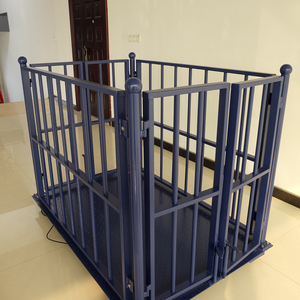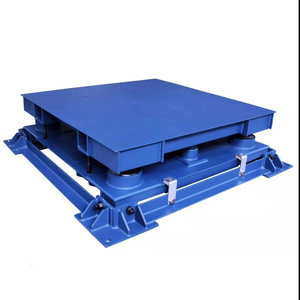
Weighing scales are integral to the logistics industry, serving as essential tools for ensuring accuracy, efficiency, and compliance throughout various stages of the supply chain. From transportation and warehousing to distribution and regulatory adherence, weighing scales play a pivotal role in maintaining operational integrity and optimizing logistics processes. This comprehensive exploration delves into the diverse applications of weighing scales in logistics and underscores their significance in maintaining seamless operations and meeting industry standards.
Ensuring Accurate Load Measurement
Transportation and Shipping
In logistics, accurate load measurement is crucial for ensuring that transportation vehicles are loaded within safe and legal weight limits. Overloading can lead to increased fuel consumption, vehicle wear and tear, and potential fines or penalties for non-compliance with transportation regulations. Weighing scales, such as truck scales and weighbridges, are used to measure the weight of goods before they are loaded onto trucks, ships, or airplanes. This ensures that each vehicle is loaded efficiently and safely, optimizing transportation costs and preventing damage to infrastructure.
Accurate weight measurement also plays a critical role in calculating shipping costs. Freight charges are often based on the weight of the cargo, and accurate weighing ensures that customers are billed correctly, avoiding disputes and enhancing customer satisfaction. By providing precise weight data, weighing scales help logistics companies maintain transparency and trust with their clients.
Load Optimization
Weighing scales are essential for load optimization, ensuring that vehicles are loaded to their maximum capacity without exceeding weight limits. This not only maximizes the efficiency of each trip but also reduces the number of trips required, thereby saving fuel and reducing overall transportation costs. Load optimization also contributes to reducing the carbon footprint of logistics operations, supporting sustainability initiatives.
In addition to optimizing vehicle loads, weighing scales are used to balance loads evenly, preventing issues such as shifting cargo or uneven weight distribution that could affect vehicle stability and safety. This is particularly important for long-haul transportation, where maintaining vehicle balance is critical for safe operation.
Enhancing Inventory Management
Warehouse Operations
In warehousing, weighing scales are used to manage inventory accurately, ensuring that stock levels are maintained and discrepancies are minimized. Scales are employed to weigh incoming and outgoing goods, providing precise data for inventory records and facilitating better inventory control. Accurate weight measurements help warehouse managers track stock levels, identify shortages or surpluses, and make informed decisions about reordering and stock management.
Weighing scales also play a vital role in order fulfillment and packing processes. By measuring the weight of individual items or packages, warehouse staff can ensure that orders are packed correctly and that shipping labels reflect the accurate weight of the shipments. This reduces the risk of errors and returns, improving overall customer satisfaction.
Automated Weighing Systems
The integration of automated weighing systems in warehouses has revolutionized inventory management. Automated scales, such as conveyor belt scales and pallet scales, can weigh items as they move through the warehouse, providing real-time data that supports dynamic inventory tracking. These systems reduce the need for manual weighing, minimizing errors and increasing efficiency.
Automated weighing systems can also be integrated with warehouse management software, allowing for seamless data exchange and enhanced inventory visibility. This integration supports better decision-making, improves operational efficiency, and reduces the likelihood of stockouts or overstock situations.
Facilitating Quality Control
Product Consistency
In logistics, maintaining product consistency is essential for meeting customer expectations and ensuring the quality of goods. Weighing scales are used to verify the weight of products at various stages of the supply chain, ensuring that they meet specified standards and tolerances. This is particularly important for industries such as food and pharmaceuticals, where accurate weight measurements are critical for compliance with quality and safety regulations.
By providing precise weight data, weighing scales help logistics companies maintain consistent product quality, reducing the risk of customer complaints and returns. This consistency also supports brand reputation and customer loyalty, contributing to long-term business success.
Quality Assurance Procedures
Weighing scales are integral to quality assurance procedures in logistics. They are used to perform spot checks on randomly selected items or packages, verifying that they meet weight specifications and identifying any discrepancies. These spot checks help in detecting issues early, allowing for corrective actions to be taken before the goods reach the customer.
In addition to spot checks, weighing scales are used in quality control laboratories to analyze the weight and composition of products. This analysis provides valuable data that supports quality assurance efforts and ensures that products comply with industry standards and regulations.
Supporting Regulatory Compliance
Weight Regulations
Compliance with weight regulations is a critical aspect of logistics operations. Transportation authorities impose weight limits on vehicles to ensure road safety and protect infrastructure. Weighing scales help logistics companies comply with these regulations by providing accurate weight measurements of vehicles and their loads. This compliance prevents fines, penalties, and potential legal issues, safeguarding the company's reputation and financial stability.
Customs and International Trade
In international trade, accurate weight measurement is essential for complying with customs regulations and documentation requirements. Weighing scales are used to measure the weight of goods being exported or imported, ensuring that the correct weight is declared on customs documents. This accuracy facilitates smooth customs clearance and avoids delays or complications at border crossings.
Weighing scales also support compliance with international trade agreements and standards, ensuring that goods meet the weight specifications required for export or import. This compliance is critical for maintaining good relationships with international trading partners and avoiding trade disputes.
Improving Cost Management
Freight Cost Calculation
Accurate weight measurement is essential for calculating freight costs in logistics. Freight charges are typically based on the weight of the cargo, and precise weighing ensures that customers are billed correctly. This accuracy helps logistics companies avoid undercharging or overcharging, maintaining profitability and customer satisfaction.
Weighing scales also support cost management by providing data that helps optimize transportation and storage costs. By accurately measuring the weight of goods, logistics companies can plan and allocate resources more efficiently, reducing operational costs and improving overall financial performance.
Budgeting and Forecasting
Weighing scales provide valuable data that supports budgeting and forecasting in logistics. Accurate weight measurements help logistics companies track material usage, inventory levels, and transportation costs, providing insights that inform financial planning. This data supports better decision-making, helping companies allocate resources effectively and plan for future growth.
By providing real-time data on weight and inventory, weighing scales help logistics companies identify cost-saving opportunities and optimize their operations. This proactive approach to cost management supports long-term financial stability and business success.
Enhancing Customer Satisfaction
Accurate Order Fulfillment
In logistics, accurate order fulfillment is essential for maintaining customer satisfaction. Weighing scales help ensure that orders are packed and shipped correctly, reducing the risk of errors and returns. By providing precise weight measurements, scales support accurate labeling and documentation, ensuring that customers receive the correct products in the right quantities.
Transparent Billing
Accurate weight measurement also supports transparent billing, enhancing customer trust and satisfaction. By providing precise weight data, logistics companies can ensure that customers are billed correctly for their shipments, avoiding disputes and maintaining positive relationships.
Transparent billing also supports customer confidence in the logistics company's services, contributing to long-term customer loyalty and repeat business. By ensuring accuracy and transparency in all aspects of their operations, logistics companies can build a strong reputation and attract new customers.
English
العربية
Français
Русский
Español
Português
Deutsch
italiano
Nederlands
Tiếng Việt
ไทย
Polski
Türkçe
ភាសាខ្មែរ
Bahasa Melayu
Filipino
Bahasa Indonesia
Română
Čeština
Монгол
қазақ
Српски
हिन्दी
Slovenčina
Slovenščina
Norsk
Svenska
Ελληνικά
Suomi
Հայերեն
Latine
Dansk
Shqip
Hrvatski
Afrikaans
Gaeilge
Eesti keel
Oʻzbekcha
latviešu
Azərbaycan dili
Беларуская мова
Български
ქართული
guarani
Кыргызча
Lietuvių
Македонски
Malti
Soomaali
Тоҷикӣ
Türkmençe
















